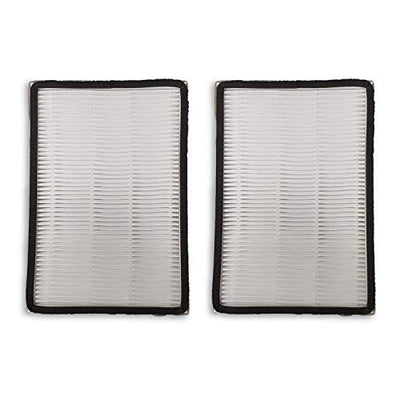HEPA Filters and Vacuum Bags: Improve Indoor Air Quality
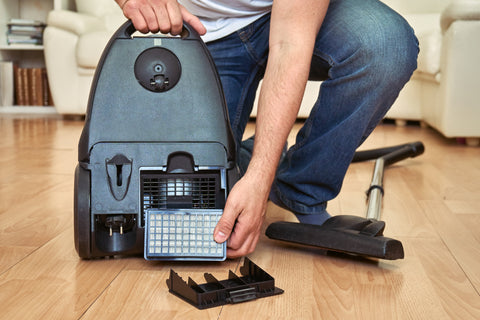
The point of buying a high-quality vacuum cleaner and using it frequently includes cleaning not only your floors but also the air in your house. After all, if you walk across the dusty floor with pet dander, dust, and allergens, they will end up flying around the room and getting on every other surface. For people with allergies, asthma, respiratory illness, or weakened immune system, this can spell disaster for their overall health.
One of the ways to improve indoor air quality with your choice of vacuum is to only buy one with an approved HEPA filter plus other filtration benefits. When it comes to filtering out bad things, vacuums frequently have more than one filter on board. These are very different whether you have an upright model that uses vacuum cleaner bags or a canister one without them.
What Is a HEPA Filter?
HEPA is an abbreviation for High Efficiency Particulate Arrestance. This is a fancy way of saying that the filter is really good at stopping different types of particles from going through it. That is what it air filter is all about, so it makes sense to get a high efficiency one whenever possible. It is important to note that only filters approved by the US Department of Energy (DOE) regulations can legally be called true HEPA filters. These are often considered true or absolute HEPA filters. You may find vacuums with HEPA-type filters, too. These do not fit the requirements put forth by the DOE.
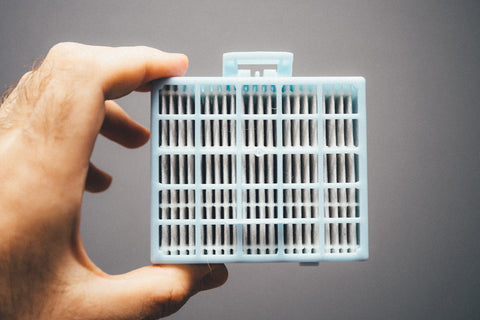
Is important for the average home to only use a true or absolute HEPA filter? Ultimately, the decision is up to you. Even ones that are not approved by the DOE usually give a high degree of filtration as long as they work the same way as a HEPA filter does. Of course, vacuum cleaners have other types of filters inside, too. For example, the bags you use filters out many particles as the air passes through it.
It canister vacuum may have a sieve filter to catch the largest dust and foam or other dense material options that catch smaller particles. These are mechanical filtration systems because they only deal with the physical stoppage of dust and other tiny things.
How Well do HEPA Filters Really Work?
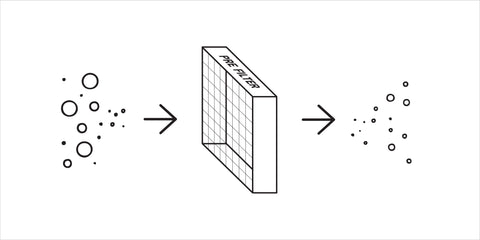
Instead of just offering mechanical filtration that stops tiny particles from getting through, HEPA filters function in different ways. These fiberglass structures actually attract microscopic particles that stick to the fibers instead of just getting blocked by them. Different sizes stopped in different ways, but it must work exceptionally well to get official HEPA filter designation. In fact, the DOE requires a 99.97% particle removal rate, which is about as close to perfect as you can get with anything.
What Do These Filters Remove From Your House?
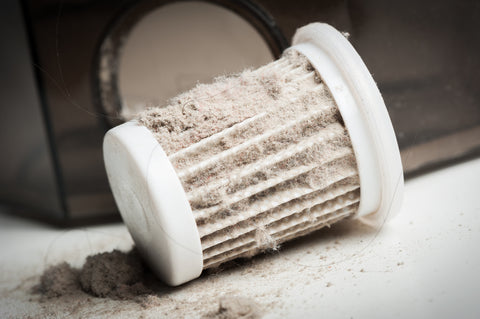
As amazing as any type of filter seems, it is not worth it if it does not remove potentially dangerous or unhealthy particles from the air. This is how it works with a HEPA filter.
1 – You vacuum your floors or other surfaces in the normal way. The dust, debris, and particles get sucked up through the hose or tube and pass through the filters contained within the vacuum.
2 – The mechanical filters made of mesh or foam catch the largest particles first. This group includes things like pet hair, clumps of dust, and small pieces of debris. In a machine with a disposable bag, these fly into it right away and get caught in there.
3 – The smaller particles pass through the first filters and get caught on the next. Many vacuum cleaners have multiple mechanical filters with denser construction to catch more particles.
4 – Before the air gets blown back out into the room, it passes through a HEPA filter and gets polished even more. These remove particles as small as 0.3 microns in size. To give some indication of how small this is, the average human hair is 50 to 70 microns wide. A mold spore or piece of pollen is 10 microns in diameter.
Since an approved HEPA filter must filter out 99.7% of all 0.3-micron particles, they get rid of the vast majority of things like bacteria, larger viruses, tobacco smoke, and fumes from cleaning products and other chemicals, and even things like lead or asbestos. Please note that a HEPA filter is no replacement for environmental remediation if your house contains toxic building materials.
Is a HEPA Filter Worth the Investment?
Do you want to breathe fresh air every day? Do you care about the health and well-being of the people and pets inside your home? Vacuum cleaners without HEPA filters still do an exceptional job of getting rid of dirt and unhealthy particles inside. They can extend the life and beauty of your carpeting, make everything look clean and attractive, and improve indoor air quality up to a point.
However, the amazing power and popularity of HEPA filters means you do not have to stretch your budget to invest in a vacuum cleaner that uses them. They are quite common in the market today. Therefore, it makes sense to look for an official Department of Energy approved option when you are shopping for your next cleaning machine.
An Essential Tool for Certain People
While scientific research specifically targeting rates of infection, asthma attacks, or allergic responses in rooms cleaned with HEPA filters and without them is relatively uncommon, the filters themselves have been extensively tested to make sure they do what they claim. The US DOE has developed their standards and requirements to ensure that the filters that bear this name provide genuine benefits for indoor air quality.
If your child has asthma, why would you choose a vacuum cleaner without the best filtration possible? If you have pets that always makes the air quality worse with their hair, dander, and the dirt they drag in from outside, why would you avoid cleaning your carpets and upholstery as well as possible? If anyone in your home has allergies, why purchase a vacuum cleaner that sucks up dirt but does nothing for pollen or mold spores that can make them experience unpleasant symptoms?
A high-quality vacuum cleaner with the right vacuum bags and onboard HEPA filtration systems can transform how easily you breathe inside. It can help eliminate smells, get rid of allergens, and may even help prevent illnesses by filtering out bacteria and viruses from the air.
Improving Indoor Air Quality With Your Vacuum

Everyone wants a fresh and clean home for their family and guests to enjoy. This is why you use a vacuum cleaner to begin with. However, if your model does not come with a HEPA filter, high filtration bags, or other quality filters inside, you may not get the clean you want. Besides leaving a lot of dust and debris back on your floors to make things look dingy and damage your carpets over time, you will also end up with poor air quality in every room.
What Is Indoor Air Pollution?
Although pollution sounds like a serious word for the air inside your home, it does speak to a problem with cleanliness and healthiness. Although you do not have to worry about industrial off-gassing or serious chemical toxins flying around, many of the everyday pollutants can affect the health of everyone who comes into your house.
Common air pollutants in a home include:
- Dust and the dust mites that live on it
- Pet hair particles and pet dander
- Mold spores that grow in damp areas
- Pollen from indoor and outdoor plants
- Pest or insect feces particles
- Viruses and bacteria
- Food and oil from cooking
- Tobacco smoke residue
- Chemical residue from cleaning, hobbies, etc.
It can feel quite scary to realize that you may have all of these pollutants in your home. Most do not cause any health problems whatsoever, and regular cleaning takes care of them. However, your carpets and upholstery are spots where these tiny particles can hide. This is why you need a quality vacuum cleaner with a HEPA and other filters.
Improving the indoor air quality in your home helps everyone breathe more easily. If you or another person living there has allergies, asthma or other respiratory issues, is elderly or an infant, or has a compromised immune system for any reason, you want to get all the dust, pet dander, mold, pollen, bacteria, and chemical residue out of your house.
When you go shopping for a new vacuum cleaner, choose a make and model with an onboard filtration system that offers multiple ways of removing unhealthy particles from your life. Invest in vacuum cleaner bags that are highly rated to contain everything or look for a canister vacuum with a HEPA filter and other mechanical filters inside. Also, remember to change the bag and filters frequently or clean them as recommended by the manufacturer. A dirty filter will not give you the results for improved indoor air quality that you need.


